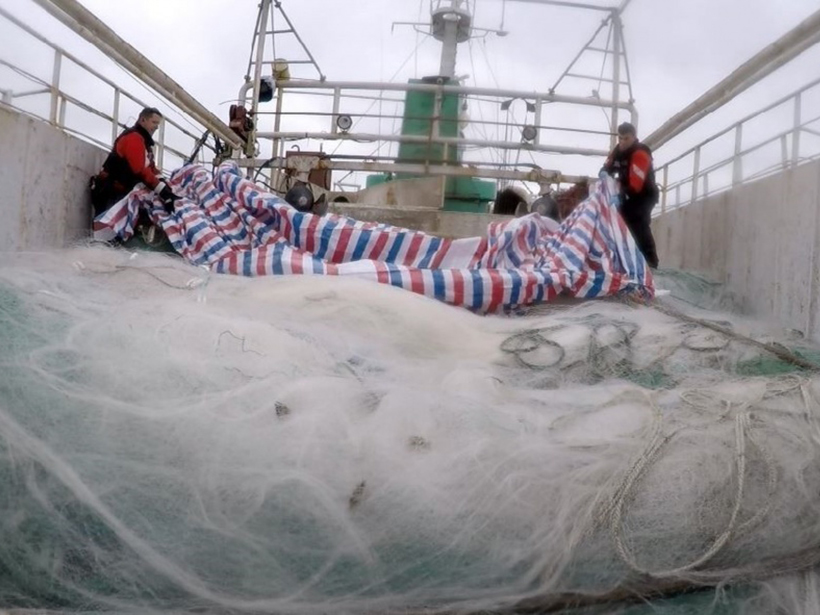When the U.S. and Chinese coast guards in June jointly intercepted the Chinese-flagged Run Da fishing vessel in the north Pacific Ocean, the coast guard crews discovered almost 73 metric tons of illegally caught salmon.
That joint maneuver gave a glimpse of the vast problem of illegal, unregulated, and unreported (IUU) fishing—which wreaks economic and ecological damage to fisheries—and also a sign that countries can work together on the issue.
At an 18 September Senate hearing on IUU fishing and conflicts over fisheries, Sen. Dan Sullivan (R-Alaska) cited the incident as an example of international cooperation. However, he also called China “perhaps the largest state sponsor of illegal fishing” and said that the Chinese government annually “funnels billions of dollars in subsidies to its distant water fishing industry.”
Sullivan, chairman of the Senate Commerce, Science, and Transportation subcommittee that convened the hearing, also noted that there appears to be bipartisan support in Congress for dealing with the IUU problem to protect U.S. fisheries.
“As fish stocks move with changing environmental conditions and expanding global populations demand consistent and affordable access to protein, pressure has increased on global fishery resources,” Sullivan said. He asserted that it’s not for the United States to protect only its own fisheries. “Highly migratory species coupled with changing conditions in the oceans means that we have to embrace the global nature of the challenge facing this critical resource.”
A Serious Threat
“IUU fishing remains a serious threat to fisheries worldwide.”
Retired ambassador David Balton bluntly testified at the hearing that “the world’s ocean is not in good shape” because of the serious and interrelated challenges of unsustainable fisheries, marine pollution, climate change ocean acidification, and other phenomena.
“IUU fishing remains a serious threat to fisheries worldwide,” said Balton, who served as deputy assistant secretary for oceans and fisheries in the U.S. Department of State and is currently a senior fellow at the Woodrow Wilson International Center for Scholars in Washington, D. C.
IUU fishing could total more than $36.4 billion annually in black market profits and accounts for one out of every five fish caught globally, according to a February study by the Stimson Center, a Washington, D. C.–based policy research center. However, Balton explained that estimates of IUU fishing “are probably not reliable” because of the difficulty of obtaining hard data on the topic. He added that it is also uncertain whether the amount of IUU fishing is increasing or decreasing.
Wars over Fish?
At the hearing, the subcommittee’s ranking Democrat, Sen. Tammy Baldwin (D-Wis.), said that the U.S. fishing industry is valued at $250 billion annually and that challenges posed by IUU fishing and other problems have economic, ecological, and security implications.
“Experts are warning that we are entering an era of natural resource conflict where wars will be fought over fish.”
“Our oceans are under siege from overfishing, illegal, unreported and unregulated fishing, as well as climate change and ocean acidification. These pressures are diminishing fish stocks around the world and changing where fish populations are found,” she said.
“Tensions are building on the high seas and in territorial waters. Experts are warning that we are entering an era of natural resource conflict where wars will be fought over fish,” she said.
Labor Abuses
IUU fishing is also connected to labor abuses, with fishing crews often working in poor and exploitive conditions, Bama Athreya, a labor and employee rights specialist with the U.S. Agency for International Development, testified. “Our experience has shown that [IUU] fishing and human trafficking have common drivers” and need to be addressed together, she said.
Situation May Be Better Than It Used to Be
Balton pointed to a number of steps that have been taken to combat IUU fishing, including the Port State Measures Agreement (PSMA) that entered into force in 2016 with 55 parties, including the United States. One aim of the agreement is to provide developing countries with resources to prevent illegally caught fish from being landed in their ports.
He also cited efforts by regional fisheries management organizations to address IUU fishing, the upcoming signing in October by the United States and others of the Agreement to Prevent Unregulated High Seas Fisheries in the Central Arctic Ocean, and other measures. One of those measures is recently introduced bipartisan legislation, the Maritime Security and Fisheries Enforcement Act, that directly addresses IUU activity.
“I’m not saying the system is perfect, or even good, but it’s better than it used to be.”
Balton said that even with these measures, much more should be done to curb IUU fishing, including promoting widespread adherence to and implementation of the PSMA; expanding fish traceability programs, ending subsidies that contribute to IUU fishing; and getting the United States to accede to the Law of the Sea Convention.
“Things have actually gotten better at the international level over the course of my time of doing this, basically the last quarter century,” Balton said about dealing with IUU fishing. “We now have a better international system, a series of international agreements that are linked, [and] international organizations that are working more effectively on this.”
He continued, “I’m not saying the system is perfect. I’m not saying it’s even necessarily good. But it’s certainly better than it used to be.”
—Randy Showstack (@RandyShowstack), Staff Writer
Citation:
Showstack, R. (2018), Congressional hearing tackles illegal fishing, Eos, 99, https://doi.org/10.1029/2018EO106929. Published on 26 September 2018.
Text © 2018. The authors. CC BY-NC-ND 3.0
Except where otherwise noted, images are subject to copyright. Any reuse without express permission from the copyright owner is prohibited.

